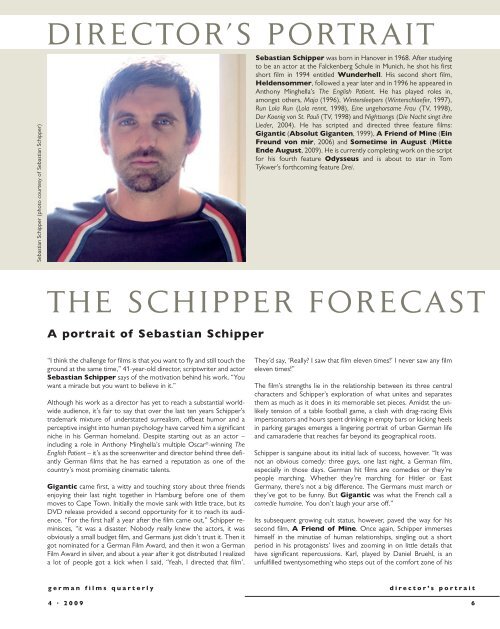Quarterly 4 · 2009 - German Films
Quarterly 4 · 2009 - German Films
Quarterly 4 · 2009 - German Films
Create successful ePaper yourself
Turn your PDF publications into a flip-book with our unique Google optimized e-Paper software.
Sebastian Schipper (photo courtesy of Sebastian Schipper)<br />
DIRECTOR’S PORTRAIT<br />
Sebastian Schipper was born in Hanover in 1968. After studying<br />
to be an actor at the Falckenberg Schule in Munich, he shot his first<br />
short film in 1994 entitled Wunderhell. His second short film,<br />
Heldensommer, followed a year later and in 1996 he appeared in<br />
Anthony Minghella’s The English Patient. He has played roles in,<br />
amongst others, Maja (1996), Wintersleepers (Winterschlaefer, 1997),<br />
Run Lola Run (Lola rennt, 1998), Eine ungehorsame Frau (TV, 1998),<br />
Der Koenig von St. Pauli (TV, 1998) and Nightsongs (Die Nacht singt ihre<br />
Lieder, 2004). He has scripted and directed three feature films:<br />
Gigantic (Absolut Giganten, 1999), A Friend of Mine (Ein<br />
Freund von mir, 2006) and Sometime in August (Mitte<br />
Ende August, <strong>2009</strong>). He is currently completing work on the script<br />
for his fourth feature Odysseus and is about to star in Tom<br />
Tykwer’s forthcoming feature Drei.<br />
THE SCHIPPER FORECAST<br />
A portrait of Sebastian Schipper<br />
“I think the challenge for films is that you want to fly and still touch the<br />
ground at the same time,” 41-year-old director, scriptwriter and actor<br />
Sebastian Schipper says of the motivation behind his work. “You<br />
want a miracle but you want to believe in it.”<br />
Although his work as a director has yet to reach a substantial worldwide<br />
audience, it’s fair to say that over the last ten years Schipper’s<br />
trademark mixture of understated surrealism, offbeat humor and a<br />
perceptive insight into human psychology have carved him a significant<br />
niche in his <strong>German</strong> homeland. Despite starting out as an actor –<br />
including a role in Anthony Minghella’s multiple Oscar ® -winning The<br />
English Patient – it’s as the screenwriter and director behind three defiantly<br />
<strong>German</strong> films that he has earned a reputation as one of the<br />
country’s most promising cinematic talents.<br />
Gigantic came first, a witty and touching story about three friends<br />
enjoying their last night together in Hamburg before one of them<br />
moves to Cape Town. Initially the movie sank with little trace, but its<br />
DVD release provided a second opportunity for it to reach its audience.<br />
“For the first half a year after the film came out,” Schipper reminisces,<br />
“it was a disaster. Nobody really knew the actors, it was<br />
obviously a small budget film, and <strong>German</strong>s just didn’t trust it. Then it<br />
got nominated for a <strong>German</strong> Film Award, and then it won a <strong>German</strong><br />
Film Award in silver, and about a year after it got distributed I realized<br />
a lot of people got a kick when I said, ‘Yeah, I directed that film’.<br />
They’d say, ‘Really? I saw that film eleven times!’ I never saw any film<br />
eleven times!”<br />
The film’s strengths lie in the relationship between its three central<br />
characters and Schipper’s exploration of what unites and separates<br />
them as much as it does in its memorable set pieces. Amidst the unlikely<br />
tension of a table football game, a clash with drag-racing Elvis<br />
impersonators and hours spent drinking in empty bars or kicking heels<br />
in parking garages emerges a lingering portrait of urban <strong>German</strong> life<br />
and camaraderie that reaches far beyond its geographical roots.<br />
Schipper is sanguine about its initial lack of success, however. “It was<br />
not an obvious comedy: three guys, one last night, a <strong>German</strong> film,<br />
especially in those days. <strong>German</strong> hit films are comedies or they’re<br />
people marching. Whether they’re marching for Hitler or East<br />
<strong>German</strong>y, there’s not a big difference. The <strong>German</strong>s must march or<br />
they’ve got to be funny. But Gigantic was what the French call a<br />
comedie humaine. You don’t laugh your arse off.”<br />
Its subsequent growing cult status, however, paved the way for his<br />
second film, A Friend of Mine. Once again, Schipper immerses<br />
himself in the minutiae of human relationships, singling out a short<br />
period in his protagonists’ lives and zooming in on little details that<br />
have significant repercussions. Karl, played by Daniel Bruehl, is an<br />
unfulfilled twentysomething who steps out of the comfort zone of his<br />
german films quarterly director’s portrait<br />
4 <strong>·</strong> <strong>2009</strong> 6

















